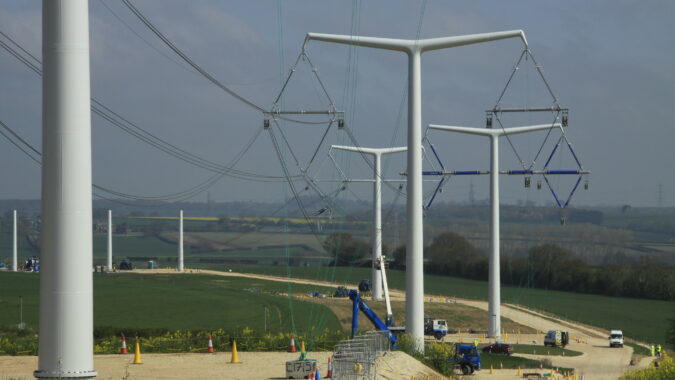Regulation & Resilience
Effective policies and regulation are needed to help infrastructure sectors to prepare for an uncertain future.
Updated:

Summary
To ensure the UK’s infrastructure is prepared for the major challenges of the future – such as the impacts of climate change and population growth - those planning and running key systems and services need clear policy direction and long term objectives. They also need to work within a regulatory system that supports these aims.
This is particularly important when it comes to further enhancing the resilience of our vital infrastructure.
The UK needs infrastructure systems which are resilient to future challenges including environmental threats like climate change. At the same time infrastructure systems need to be built and operated to repair past damage to the environment and deliver environmental improvements in the future.
In January 2022 the Government published a policy paper in response to the recommendations the Commission made in its regulation study in 2019. This committed the Government to issuing additional strategic guidance to regulators, reviewing their duties and exploring using competition for strategic investments, in line with the Commission’s report.
Improving the resilience of infrastructure to the impacts from climate change is one of the strategic themes shaping the Commission’s Second National Infrastructure Assessment. The report highlights that infrastructure and the environment are interdependent. Infrastructure reliability is threatened by environmental risks, while infrastructure systems can also affect the environment. In addition to specific recommendations on the resilience of specific sectors, the Assessment also recommends:
- setting national standards for how different infrastructure services should operate in the face of different challenges (that might be a storm, power cuts, flooding etc)
- giving regulators the powers to ensure that when they make future agreements with infrastructure companies about their future investment plans, those plans are consistent to meet these national resilience standards
- regular ‘stress testing’ of infrastructure systems by operators, under the watchful eye of the regulators – not just for testing the performance of individual systems, but also testing for the risk of ‘cascading’ failures
- ensuring engineering standards for new infrastructure take into account future climate chang
- requiring infrastructure operators to estimate the cost of maintaining resilience standards between now and 2050.
Along with our related work, such as on financing nuclear projects, we seek to chart how government, regulators and relevant sectors might create the best environment to enable market-led solutions for securing sustainable and reliable infrastructure which addresses the UK’s future needs.
Regulation & resilience data
Data sets relating to infrastructure regulation and resilience are available to review on our Data pages. The data can be reviewed online or downloaded.
Review dataNext Section: Key issues
Here you will find a summary of the Commission’s positions on key issues emerging from our work related to regulation and resilience.
Key issues
Here you will find a summary of the Commission’s positions on key issues emerging from our work related to regulation and resilience.
Regulation to drive investment in net zero infrastructure
Climate change, growing demand and increased digitalisation is putting more pressure on the country’s infrastructure systems, and strategic, long term investment across water, energy and telecoms is needed to enable them to adapt.
In its 2019 report Strategic investment and public confidence, the Commission recommended that the government sets out a long term vision for each of these sectors and give regulators new powers. This will enable companies to invest in sustainable infrastructure to reduce emissions, ensure reliable digital connectivity and build resilience to floods and drought, while still protecting consumers’ interests.
The high levels of investment will come from the private sector, but is ultimately funded by consumers and businesses, so they need to have confidence that their money is being spent on the right things and that they are not being exploited. Investors benefit from a regulatory system that is trusted by the public and government, so the Commission recommends that an updated regulatory system should more fairly balance the risk and reward between investors and consumers and work for all groups of consumers.
In the Second National Infrastructure Assessment, the Commission identified that overall infrastructure investment needs to increase from an average of around £55 billion per year over the last decade to around £70 to 80 billion per year in the 2030s and £60 to £70 billion per year in the 2040s, in order to achieve the low carbon and resilient infrastructure that supports economic growth and protects the environment. In response, the Commission made a number of recommendations including:
- setting outcomes based standards for energy, water, digital and transport services, along with a requirement on economic regulators (such as Ofwat and Ofgem) to ensure their settlements with operators on future investment are consistent with operators being able to meet those standards
- asking operators to estimate the cost of maintaining resilience up to 2050, in time to inform the next round of regulatory settlements for water, digital and energy networks
- reform of public spending frameworks to provide longer term certainty and more effective management of major projects.
Resilient infrastructure systems
The nation’s energy, water, digital, and transport systems are vulnerable to shocks and stresses such as those caused by heatwaves, accidents, surges in demand or flooding. Many risks are exacerbated by climate change.
With infrastructure systems increasingly interconnected, the knock-on effects of any failure can have major impacts on the economy and people’s lives.
Government, regulators, and operators all have a role to play. The resilience framework the Commission set out in its original resilience report in 2020 was designed to improve how infrastructure systems anticipate, resist, absorb, and recover from shocks and stresses, while valuing resilience properly and driving adaptation and transformation to meet the needs of the future.
The Second National Infrastructure Assessment has subsequently made a number of recommendations on improving the resilience of individual infrastructure sectors and infrastructure systems as a whole, including government setting clear resilience standards every five years, and giving powers to regulators to ensure that regulatory settlements with energy, water and digital operators would support sufficient investment to reach these new standards.
The Assessment also recommends infrastructure operators stress testing their systems to demonstrate they can meet resilience standards and address vulnerabilities.
Climate resilience
Most of the infrastructure assets the UK will have in 2050 have already been built, but they will have to cope with a changing climate. The increasing number of hot days in summer may cause transport delays. Increasing summer rain intensity increases the risk of asset sites being flooded. And drought can lead to subsidence causing underground assets and earthworks to fail.
In the Second National Infrastructure Assessment the Commission recommended that government should, in time to inform the next round of regulatory settlements, require infrastructure operators to set out the costs of maintaining the service levels set out in government resilience standards by 2050 despite the risks posed to asset systems by climate change.
To support this, the Commission recommended that the government should ask the Met Office and infrastructure operators to work together on ensuring that infrastructure operators have access to the climate data they need in an accessible format. The Commission also asked government to work with standards bodies such as the British Standards Institution to update high priority technical engineering input standards to ensure assets are designed for future climate extremes, and not those expected in the past.
Improving resilience to drought
Climate change and population growth puts increasing pressure on England’s water: there is a one in four chance of a serious drought before 2050. Boosting resilience, the Commission showed in its 2018 report Preparing for a drier future, is almost half as expensive as relying on emergency measures in times of drought (saving up to £20 billion over the next 30 years).
A twin-track approach of managing demand and enhancing supply is needed to deliver by 2050 an extra 4,000 million litres of water every day to reduce the risk of drought. This can be achieved by the government, regulators and water companies working together to deliver a national water transfer network and additional supply by the 2030s, halving leakage by 2050 and better managing demand.
In the Second National Infrastructure Assessment the Commission recommended that government should enable all water companies to roll out compulsory smart metered charging to better manage demand. The Commission also argued that water resource expenditure, on both supply and demand, should not be priced out of the upcoming price review in the face of other upwards pressures on bills.
Resilience to flooding from rivers and the sea
Climate change increases the likelihood of flooding. UK cities, towns and villages must adapt and improve their resilience to its impacts: currently, about five million homes are at risk.
Floods impact on people’s lives as well as causing economic damage, but the current approach to managing flood risk is piecemeal, with progress on improving protection hard to measure.
The Second National Infrastructure Assessment set out the need for government to establish a long term target for reducing the number of properties likely to be flooded by rivers and the sea, and to track progress against this.
The Commission made the case for a nationwide standard of resilience to flooding, while also recognising that different standards of protection may be necessary in some local areas. In such cases other elements of resilience such as warning, preparing and recovering from flooding will be even more important. To support this, a new long term funding strategy is needed to better prepare and protect all parts of the country against flooding.
Flood protection should also maximise the use of nature based and catchment solutions, in recognition of the additional environmental benefits they can bring.
Finally, planning authorities should ensure that new development does not increase flood risk elsewhere.
Headline recommendations
Set outcome based resilience standards for energy, water, digital and transport services
By 2025, government should:
- following advice from regulators, publish a full set of outcome based resilience standards for energy, water, digital, and transport services, committing to future reviews every five years
- require regulators to ensure their determinations in future regulatory settlements are consistent with operators meeting these resilience standards in the short and longer term
- require regulators to put in place a system for cross sector stress testing which addresses interdependencies and the risk of cascade failures.
Ask infrastructure operators to estimate the cost of maintaining government resilience standards up to 2050
In time to inform the next round of regulatory settlements (for water, digital and energy networks) or spending reviews (for road and rail networks and flood risk management infrastructure), government should ask infrastructure operators to estimate the costs of maintaining government resilience standards in the face of projected climate change to 2050. For sectors without formal spending settlements, such as ports and waste, these should be reported by 2029. All sectors should publicly report adaptation costs in a compulsory fifth round of Adaptation Reporting Power reports in 2029
Develop an accessible interface for asset owners to use relevant climate data
By the end of 2025 the Met Office, infrastructure operators and appropriate regulators should work together to develop an accessible interface for asset owners to use relevant climate data. In time to inform the fourth National Adaptation Plan and the fifth Climate Change Risk Assessment, government should consider whether another UK Climate Projection is needed to fill data gaps to support infrastructure operators in planning for climate adaptation
Ensure technical engineering standards factor in future climate change
By the end of 2026 government should work with the relevant standards bodies to identify and update core technical engineering standards to factor in future climate change
Empower regulators to facilitate strategic investments that address long term challenges of net zero, energy security and climate resilience
Government must empower regulators to facilitate investment in a strategic way that address the long term challenges of net zero, energy security and climate resilience by:
- setting out a long term strategic vision for each of the regulated sectors, through strategic policy statements, updated during each Parliament
- requiring regulators to enhance the role of competition by introducing legislation to remove any barriers to the use of competition and focusing ‘standard’ periodic price controls on the maintenance of existing networks and using tendering processes for strategic enhancements, with a clear, public justification required where tendering is not used.
Reform public spending frameworks for infrastructure to provide longer term certainty and more effective management
By 2025, government should reform public spending frameworks for infrastructure to provide longer term certainty and more effective management by:
-
- setting fixed budgets for capital infrastructure for at least five years
- moving away from annual controls for major capital projects and instead giving major projects a fixed budget with the ability to move money forward and backward across years within that budget
- accounting for maintenance and renewal spend separately from capital or resource spend — these budgets should be set for at least five years, with departments identifying an indicative longer term pipeline that highlights any particularly large upcoming maintenance or renewal spend
- giving infrastructure ‘megaprojects’ their own ‘project expenditure limit’ including explicit contingency budgets, separate to the department which runs them
- adopting the funding profile set out by the Commission’s recommendations in future spending reviews.
Clear, proportionate and realistic resilience standards set by government
Government should introduce a statutory requirement by 2022 for Secretaries of State to publish:
- clear, proportionate and realistic standards every five years for the resilience of energy, water, digital, road and rail services
- an assessment of how existing structures, powers and incentives enable operators to deliver these standards or where changes are needed.
Regulators should introduce obligations on infrastructure operators to meet these resilience standards by 2023.
Stress testing of infrastructure sectors
Regulators should require a system of regular stress testing by 2024 for energy, water, digital, road and rail infrastructure operators, to ensure that infrastructure operators’ systems and decision-making can credibly meet resilience standards for infrastructure services.
Regulators should introduce obligations by 2023 on infrastructure operators to require them to participate in stress tests and to require remedial action in case of failure of stress tests.
Infrastructure operators should develop strategies to ensure services meet resilience standards in the long term
Energy, water, digital, road and rail infrastructure operators should develop and maintain strategies to ensure infrastructure services can continue to meet resilience standards in the long term. To ensure this, regulators should:
- introduce obligations by 2023 on infrastructure operators to require them to develop and maintain long term resilience strategies (where there is no current requirement)
- set out, in future price reviews, how their determinations are consistent with meeting standards of resilience in both the short and long term.
A clearer strategic framework for the long term investment needs of the country
Forward looking regulation, by independent regulators, remains the best approach to balancing the needs of consumers and investors, whilst incentivising efficiency. However, this should be embedded in a clearer strategic framework for the long term investment needs of the country:
- The government should introduce legislation by 2021 to fulfil its previous proposal that regulators have regard to endorsed recommendations from the Commission
- The government should set out a long term strategic vision for each of the regulated sectors, through strategic policy statements, within the first year of each Parliament, to support lasting plans and stable funding.
Regulatory frameworks should reflect the devolution of powers within the UK
Regulatory frameworks should reflect the devolution of powers within the UK:
- Ahead of the next price controls, regulators should put in place formal mechanisms, such as advisory committees, to ensure they have regard to the strategic vision set out by devolved administrations, where devolved and reserved powers interact
- In future price controls, regulators should demonstrate how they have taken consideration of the strategic vision of metro mayors and relevant local government, within devolved powers, where this has material impacts for network investment
- Regardless of specific devolved powers, regulators should engage with the views of elected representatives, alongside other sources of insight into consumers and the public’s preferences.
Updating regulators’ duties
Regulators’ duties need to be coherent, covering price, quality, resilience and environment. Government should introduce legislation by 2021 ensuring that, where they are currently missing, Ofwat, Ofgem and Ofcom have duties to require them to seek to:
- Ensure their decisions promote the resilience of infrastructure systems
- Ensure their decisions are consistent with, and promote the achievement of, the government’s legislated greenhouse gas emissions targets, currently achieving net zero greenhouse gases by 2050
- Collaborate with other regulators, where relevant, to avoid contradictory regulation and promote efficient outcomes for consumers on cross-sectoral issues.
Using competition to support innovation
The use of competition should be enhanced as the most reliable means of supporting innovation, particularly where there is rapid technological change:
- Regulators should focus ‘standard’ periodic price controls on the maintenance of existing networks and marginal enhancements
- Ofcom should continue to promote infrastructure competition for fibre and mobile networks
- Government should introduce legislation, ahead of the next price controls, to remove any barriers to the use of competition in the provision of strategic enhancements to water and energy networks
- For future price controls, Ofwat and Ofgem should separate consideration of strategic enhancements from the ‘standard’ periodic price control. Ofwat and Ofgem should develop tendering processes for strategic enhancements, with a clear, public justification required where tendering is not used
- Government should ensure that regulators have the resources they need to carry out competitive tenders for transformational investments.
Regulators should address financial risk and corporate governance issues
Regulators should be more proactive in addressing financial risk and corporate governance, to ensure that rewards reflect performance and risks that are genuinely taken by investors:
- In future price controls, regulators should take direct account of information asymmetries in assessing the weighted average cost of capital and total expenditure allowances, ‘aiming off’ to ensure a fair outcome for consumers and investors
- In future price controls, regulators should introduce outperformance sharing mechanisms to allow consumers to share in the benefits that equity investors achieve from high gearing, where companies have gearing levels which significantly exceed the level assumed by the regulators
- For natural monopoly companies, regulators should evaluate the case for an absolute cap on gearing
- For firms with a natural monopoly, regulators should ensure executive salaries are demonstrably linked to long-term performance for consumers and the public.
Prevent companies from engaging in price discrimination that does not provide an overall benefit to consumers
Regulators should be able to prevent companies from engaging in price discrimination that does not provide an overall benefit to consumers:
- Regulators should require companies to report annually on which groups of customers are paying more for the same service; companies should be required to publicly justify their price discrimination policies or rectify them
- Regulators should be able to require companies to change their price structures where price discrimination cannot be justified by benefits to consumers
- Government should introduce legislation, by 2021, to replace the current court-based enforcement of consumer law with an administrative compliance and enforcement model, subject to appropriate scrutiny by the courts.
Closer attention to distributional consequences for customers
Government and regulators cannot rely on a flawed assumption that market design and distributional consequences can be separated. For future regulatory proposals with significant distributional consequences:
- Regulators should publish an analysis of the distributional consequences for consumers and businesses of their proposals, and of the impact of possible mitigations for significant adverse effects
- Regulators’ boards should be given the power, by 2021, to seek explicit guidance from ministers on strategic policy direction and distributional choices, against a menu of feasible options provided by the regulator and within a fixed three-month period
A stronger role for the UK Regulators Network
The UK Regulators Network should have a stronger role, supported by an independent chair:
- By the end of 2020, the UK Regulators Network should appoint an independent chair
- By the end of 2020, the government should review data sharing powers by regulators to ensure they can develop a ‘whole customer view’
- By the end of 2021, regulators, with the support of the UK Regulators Network, should develop joint data sets to enable whole customer analysis
- By July 2021, the independent chair of the UK Regulators Network should publish a business plan setting out how the network will support collaboration on the achievement of common goals; coordination to avoid contradictory regulation and inefficiency; data and knowledge sharing, including supporting the regulators to improve their data management capability; improved performance reporting by regulators.
Ensure plans are in place to deliver additional supply and demand reduction of at least 4,000 mega litres per day
Government and Ofwat should ensure plans are in place to deliver additional supply and demand reduction of at least 4,000 mega litres per day. Action to deliver this twin track approach should include:
- the Regulators’ Alliance for Progressing Infrastructure Development and Price Review process ensuring that at least 1,300 mega litres per day is provided by the mid 2030s through (i) additional strategic water transfers and (ii) additional supply infrastructure
- the water industry maintaining its objective to halve leakage from 2017-18 levels by 2050, with Ofwat agreeing five year commitments for each company (as part of the regulatory cycle) and reporting on progress
- the Department for Environment, Food and Rural Affairs enabling companies to implement compulsory metering beyond water stressed areas by 2025, by amending regulations as appropriate and requiring all companies to systematically roll out smart meters as a first step in a concerted campaign to reduce water demand to 110 litres per person per day and to reduce non-household usage by 15 per cent by 2050.
Latest Updates

We’re recruiting – Infrastructure Funding, Financing & Regulation Lead
We are recruiting for an exciting new role in the Commission’s economics and modelling team, helping shape our policy on the cross-cutting themes of economic regulation, funding and financing in all the sectors in our remit. The successful candidate will be an infrastructure/capital financing expert, and/or a regulatory specialist. This is a new role in...

Jim Hall: clear national standards vital to improved extreme weather resilience
The National Audit Office has voiced concerns about the government’s progress on ensuring the UK can be resilient to the impacts of extreme weather events, in a new report out today (6 December). Government resilience: extreme weather finds that while central government has in place a range of existing protocols for managing the impacts of...

Jim Hall: Clarity on funding, clear targets crucial to long term flood resilience
A value for money report on flood resilience in England published by the National Audit Office today (15 November) warns that under current Environment Agency plans, forty per cent fewer properties in England will be protected from flooding compared to the number first forecast in 2020. The Resilience to flooding report finds that the Environment...

Long term review sets out pressing need to modernise infrastructure to support economic growth and climate action
Improved infrastructure to boost economic growth across the UK and meet climate goals is both achievable and affordable if the right policy steps are taken now, according to the government’s independent advisers on infrastructure strategy. The Second National Infrastructure Assessment – a five yearly review conducted by the National Infrastructure Commission – sets out a...

Second National Infrastructure Assessment
The Commission's thirty year plan for a low carbon and resilient UK economy that supports economic growth and protects the natural environment

National Infrastructure Assessment
An analysis of the UK’s long term economic infrastructure needs, outlining a strategic vision over the next thirty years.

Commission welcomes net zero duty for Ofgem
The goverment has confirmed plans to amend the Energy Security Bill, currently before the House of Commons, to give the energy regulator Ofgem a new explicit net zero duty. The amendment will legally require the regulator to ensure its decisions assist the governmen’s drive to deliver zero greenhouse gas emissions by 2050 and boost investment...

Letter to Ofwat on water company asset management
Commission Chief Executive James Heath has written to Ofwat Chief Executive David Black about asset management in the water sector, specifically the approach to ‘base cost’ maintenance costs for ensuring day-to-day services (e.g. replacing water mains pipes). The letter raises concerns about the lack of a consistent understanding of asset condition across the sector and...

NIC and CCC call for urgent action to protect infrastructure from climate risks
The National Infrastructure Commission and Climate Change Committee have written jointly to government urging ministers to take steps to improve the resilience of key infrastructure services to the effects of climate change. Building on recent reports by both organisations, the advisory bodies set out five steps to accelerate national adaptation planning to protect key networks:...

Stronger coordination of environment and community benefit needed to get planning timescales back on track
A new data platform to share environmental information and effective ways of addressing the impact of proposed infrastructure projects will enable stronger protection for natural habitats and speed up schemes crucial to the net zero transition, according to a new report by the National Infrastructure Commission. The review by the government’s official infrastructure advisers also...

Delivering net zero, climate resilience and growth

Go big where it counts to hit economic and climate goals, says Commission
Government must develop stronger staying power and focus on fewer, bigger, better targeted initiatives to deliver the infrastructure needed to meet its long term goals for economic growth and a lower carbon economy, the UK’s independent advisers on infrastructure have said. The last year has seen progress towards major infrastructure objectives “stutter further just as...

Infrastructure Progress Review 2023
Our annual monitoring report on government progress towards major infrastructure objectives.

Commission to review major projects planning policy
The National Infrastructure Commission has been asked to review the current approach to National Policy Statements (NPSs) and identify how the planning system could create greater certainty for infrastructure investors, developers and local communities. The independent advisory body has been commissioned to undertake the review as government prepares to publish an Action Plan on Nationally...

Commission welcomes Resilience Framework
The UK government has published a Resilience Framework that commits to taking forward the Commission’s recommendations on resilience standards for key infrastructure sectors and stress testing to help assure them. The strategy document – the first of its kind for the UK – pledges government action to “introduce standards on resilience and develop an action...